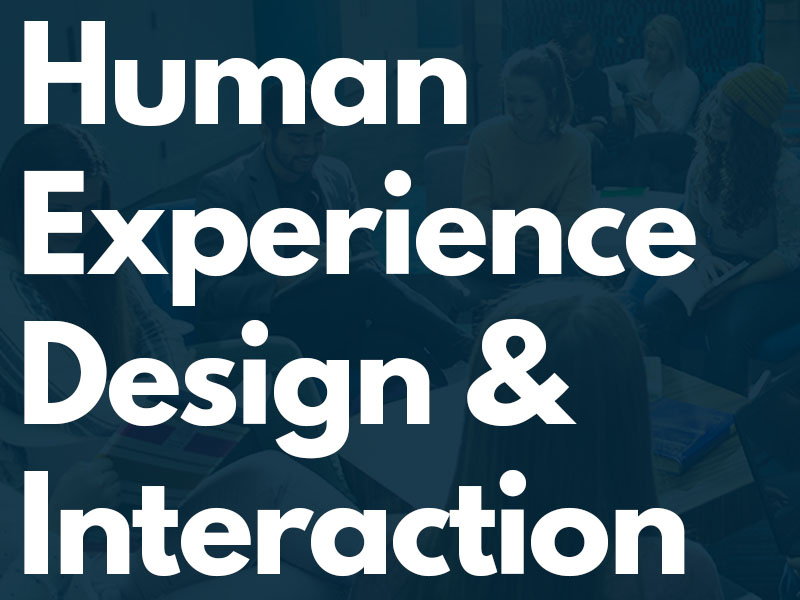What is HEDI?

The department of Instructional Technology and Learning Sciences in the Emma Eccles Jones College of Education and Human Services recently launched the all-online Human Experience Design & Interaction (HEDI) undergraduate program. Because the degree is so new, many people are unfamiliar with the HEDI field and its possibilities, despite the accelerating number of participants in the program. Individuals who are pursuing HEDI might often hear questions like "What does HEDI mean?" "What topics does the program cover?" and "What kind of job can you get with that degree?"
Whether you've heard of HEDI or not, read on to learn more about what HEDI entails and the many opportunities it offers.
HEDI
Human experience design focuses on understanding the perspective and needs of users who experience problems in order to determine whether the solutions that have been designed for them is truly meeting their needs. Andy Walker, head of the ITLS department, said, "We are surrounded by designs created by people, and yet we all have experienced designs that don't keep people in mind. From phone apps to car dashboards, design is becoming increasingly difficult for many to use. The end user needs to be able to interact with software, tools, and spaces that make sense." In the professional world, this user-focused design process is commonly known as User Experience (UX) or User Interface (UI) design.
UX involves the interaction between the user and a product or service, focusing on the process of developing and improving the quality of interaction between a user and all facets of a company. The ultimate purpose of UX design is to create easy, efficient, relevant, and all-round pleasant experiences for the user. Similarly, UI design focuses on the presentation and interactivity of a product. The goal of UI design is to visually guide the user through a product's interface and to create an intuitive experience that doesn't require the user to think too much.
Emphases
The core focus of the HEDI degree is to make design in many contexts human-centered and culturally responsive. The program's emphases are meant to help students gain a strong foundation in understanding human interaction that will propel them to create user-friendly designs in a variety of sectors.
HEDI students take a certain number of courses in two of the following emphases:
Culturally Responsive Design: Culture-based design is an essential aspect of human experience design. Intercultural study is key to designing experiences that put cultural diversity into consideration. In this emphasis, students will acquire knowledge on social work with diverse populations, cultural anthropology, and race, sex, and gender perspectives. Students will also gain insight into social and multicultural psychology.
Game Studies: The emphasis on game studies provides students with theoretical and applied knowledge in the field of videogame design and production. Students will be introduced to game theory, major game engines used in the design and development process, character and level design, and current issues in gaming related to technology and culture. The emphasis will also give students insight into the field of esports.
Product Development: This emphasis frames design thinking in the context of product design. Students will learn how to identify market opportunities, define problems, and develop proper solutions for those problems using design thinking strategies. Students will also gain knowledge in outdoor product design and development, methods of digital design and development, and digital making and learning.
Marketing: This emphasis provides students with insight into design as it relates to marketing. Students will gain knowledge about marketing strategies and research and acquire skills needed for designing brand identity. Students will also get insight into firm marketing and price analysis.
Technical Communications: Students who are interested in the communication side of user experience and interaction will be interested in this emphasis. In this emphasis, students will acquire skills such as technical and professional writing and editing, writing for digital media, and document design and graphics.
Multimedia: The multimedia emphasis equips students with the skills needed to be competent in media production. Students will acquire skills in graphic design, video and audio production, and instructional media design. The scope of this emphasis ranges from using market-standard multimedia software to the design thinking process and application of multimedia in learning.
New Venture Management: This emphasis gives students the knowledge and skills needed for entrepreneurial ventures and small businesses. Students will learn how to start their own business, understand new venture fundamentals, and manage new ventures. They will also learn the principles of marketing and financing.
Careers
HEDI is meant to help fulfill the current demand for designers who understand how to work with both the consumer and the developer to facilitate the creation of products and services. These skills are broadly applicable; jobs that the program prepares students for include instructional designers, web developers, training and development managers, project managers, program managers, product managers, UX/UI designers, game designers, graphic designers, data analysts, technical writers, and content developers.
If you are interested in creating digital and physical experiences and products to meet the needs of users in business, marketing, gaming, or communications fields, learn more about the HEDI program.

